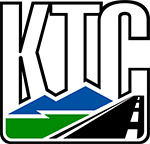EDUCATION & TRAINING AT KTC
Learn More
Courses for Transportation Professionals
The Kentucky Transportation Center has a long history of providing workshops and training courses for professionals in consulting firms and state transportation agencies. Many of KTC’s trainings benefit the Kentucky Transportation Cabinet’s (KYTC) project managers and consultants.
- Project Management Boot Camp (PMBC): an 8-day course on how a project is managed from design and construction to delivery and completion.
- Bootcamp Xpress: a condensed version of PMBC for consultants that work with the Cabinet. Consultant project managers are now required to attend this training before their firms can bid on Cabinet projects.
- Construction Project Management Academy: a multi-day construction project management training for KYTC agency staff.
- Performance Management Training: modules are based on the framework provided by FHWA’s National Highway institute. The course informs KYTC employees about the benefits and objectives of performance measurement as well as communicates KYTC’s process performance goals.
- Meeting and Communications Training: provides participants with the skill set required to conduct efficient and effective meetings including determining the type of meeting to hold, meeting preparation, current practices in meeting facilitation, and an overview of online collaboration tools.
- Construction Liability Training: a 2-day course that equips construction staff with the knowledge to make good decisions that reduce liability risks for both the Cabinet and Cabinet employees.
- Context-Sensitive Design/Solutions: a 2-day course that KTC delivered on-site to 15 state DOTs; over 175 professionals have participated in limited-size courses offered on UK’s campus.
Technology Transfer
KTC’s Technology Transfer (T2) Program offers many short courses for highway personnel employed at local agencies as part of its workforce training program. Led by Martha Horseman, the program is the Local Technical Assistance (LTAP) for Kentucky and contributes to implementing research results by providing newsletters, how-to manuals, new and existing technology updates, legislative and regulatory news, and on-site technical assistance in the form of the Safety Circuit Rider Program. Visit here to view T2’s training calendar.
TRANSPORTATION UNDERGRADUATE EDUCATION
KTC supports and shares office and laboratory space with UK’s Department of Civil Engineering. Many CE professors collaborate with KTC on research projects, allowing students to benefit from numerous transportation research opportunities. On average, KTC employs 15-20 graduate and undergraduate employees each year. The Transportation Education Program Manager is Dr. Reginald Souleyrette. He can be contacted at souleyrette@uky.edu. Dr. Souleyrette is also Program Manager of KTC’s Planning and Decision Analytics research group.
UK’s Department of Civil Engineering offers a concentration in seven areas for all Bachelor of Science candidates:
- Transportation Engineering
- Construction Engineering and Project Management
- Environmental/Water Quality
- Geotechnical Engineering
- Hydraulic Engineering
- Surveying
- Water Resources Engineering
The elective courses in the undergraduate curriculum enable each student to gain increased depth in a specialty area of interest. To learn more about the curriculum for the concentrations read more here or visit the Department of Civil Engineering Undergraduate Program.
KTC’s Technology Transfer (T2) Program offers many short courses for highway personnel employed at local agencies as part of its workforce training program. Led by Martha Horseman, the program is the Local Technical Assistance (LTAP) for Kentucky and contributes to implementing research results by providing newsletters, how-to manuals, new and existing technology updates, legislative and regulatory news, and on-site technical assistance in the form of the Safety Circuit Rider Program. Visit here to view T2’s training calendar.
Transportation Graduate Education
The Department of Civil Engineering offers programs of study leading to an M.S. degree or a Ph.D. degree. Graduate students choose to specialize in one of the seven technical areas:
- Construction Engineering and Project Management (CEPM)
- Environmental Engineering
- Geotechnical Engineering
- Materials Engineering
- Structure Engineering
- Transportation Engineering
- Water Resources Engineering
Two programs are available for the Master of Science in Civil Engineering (MSCE) degree. MSCE Program, Plan A requires completion of 24 semester hours of graduate course work plus a thesis. The thesis generally discusses an organized research topic and must be actively supervised by a member of the graduate faculty. MSCE Program, Plan B requires completion of 30 semester hours of graduate course work. The 30 hours include a three-semester hour independent study course, taken under the supervision of a faculty member who will assign the work to be performed, monitor its progress and assign a grade at its completion. A written report will generally be required for all projects.
Doctor of Philosophy (Ph.D.) Program
There are no credit hour requirements for the Ph.D. The type and number of courses required vary, depending on the background of the student. Normally, at least one year of full-time graduate course work beyond the master’s degree will be required before a student is ready to take the Qualifying Examination. At least one additional year will be required for the dissertation, which must significantly advance knowledge in the field.
To learn more about Programs of study, visit the Graduate Program page.
